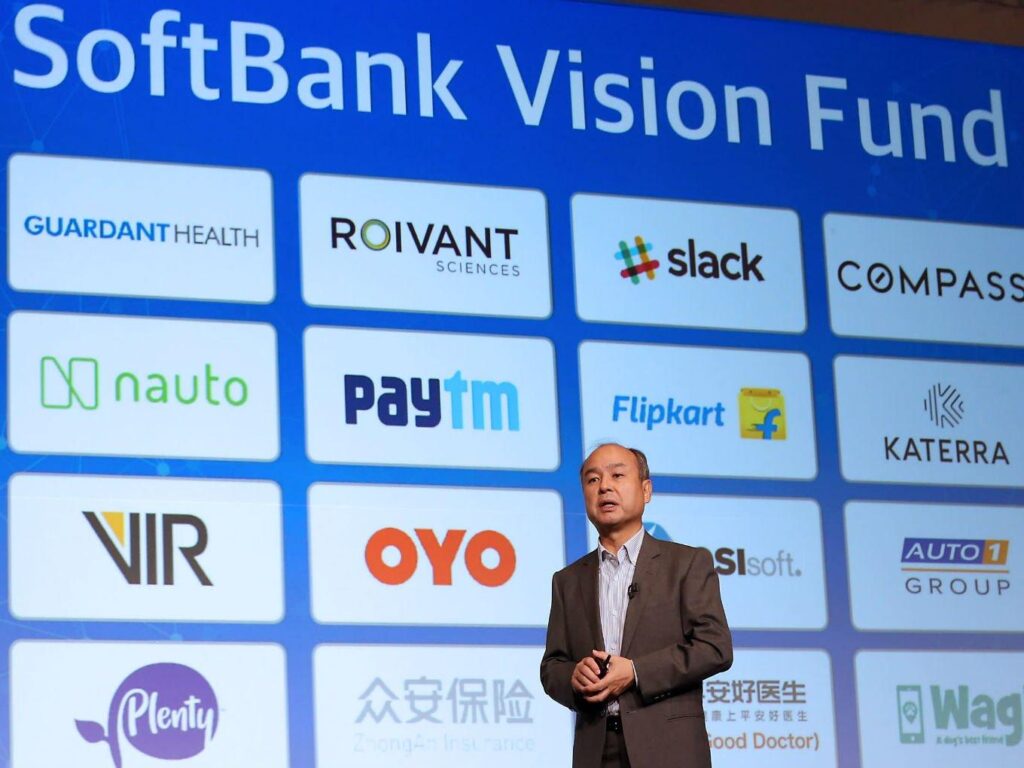SoftBank’s Vision Fund tech division has returned to profitability, and the company has revealed plans for a share buyback program worth up to $3.4 billion.

SoftBank’s Vision Fund Reports Q1 Gains Amid Broader Losses
On Thursday, June 27, 2024, workers set up for a SoftBank Group Corp. news conference in Tokyo, Japan. During the company’s fiscal first quarter, which ended in June, SoftBank’s Vision Fund reported a 1.9 billion yen ($12.9 million) investment gain, marking a return to profitability. Gains in some Chinese investments, such as ByteDance, the owner of TikTok, helped counterbalance losses from other companies like AutoStore and Symbotic. However, the Vision Fund still recorded a 204.3 billion yen loss, factoring in administrative expenses and third-party investor impacts.
Share Repurchase Announcement
SoftBank announced plans to repurchase up to 6.8% of its shares, totaling up to 500 billion yen ($3.4 billion). This move follows a previous quarter where the Vision Fund had a 159.77 billion yen gain, contrasting with a 57.53 billion yen loss in the March quarter. The Vision Fund saw its first full-year gain since 2021 in the fiscal year ending in March, benefiting from a surge in technology stocks and key holdings.
Impact of Arm’s IPO and Market Volatility
A significant contributor to the Vision Fund’s recent success was the initial public offering of chip designer Arm, in which SoftBank holds a 90% stake. Despite this, SoftBank is facing challenges with fluctuating public markets. On Monday, SoftBank shares plummeted nearly 19% due to a broader decline in Japanese stocks following an interest rate hike by the Bank of Japan. Although Japan’s main indexes rebounded on Tuesday, global markets remain unstable, with investors worried about the global economy and high valuations driven by tech stocks.
Focus on AI Investments
SoftBank is now positioning itself as a major player in the artificial intelligence sector. The company has highlighted investments in firms like Arm and the self-driving startup Wayve as evidence of its potential to benefit from AI growth. Masayoshi Son, SoftBank’s high-profile founder, re-emerged this year to share his vision of AI, predicting it will be 10,000 times smarter than humans within a decade.
Shareholder Pressure and Buyback Strategy
The buyback announcement comes amid increasing pressure from shareholders concerned that SoftBank’s market capitalization is significantly lower than the value of its assets. Share buybacks are seen as a strategy to potentially increase the company’s share price. Investment firm Elliott Management has rebuilt its position in SoftBank and has been advocating for a share repurchase program. SoftBank stated that the buyback decision was part of its shareholder return initiatives, with finance chief Yoshimitsu Goto emphasizing that the decision was made independently at the board level.
Financial Performance
In the June quarter, SoftBank’s net sales rose 9.3% year-on-year to 1.7 trillion yen, surpassing analyst expectations. The company reported a net profit of 10.5 billion yen, a significant improvement from a 316.2 billion yen loss in the same quarter the previous year. This improvement was partly due to a 235.7 billion yen investment gain on Alibaba shares and a 179.1 billion yen return on T-Mobile shares. SoftBank’s growth into one of Japan’s largest companies can be attributed to Son’s early investment in Alibaba in 2000, which has since flourished. The firm has been reducing its Alibaba stake to fund its AI investments.